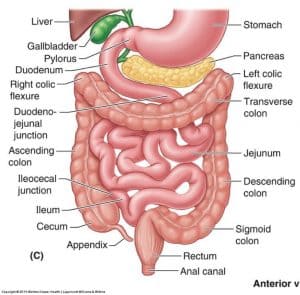How Fast Do You Digest Your Food?

naturopathicdoctorforyou.com/gut-motility
How fast you digest your food can really affect your day. Gut Motility has to do with the speed at which food substance travels through the digestive tract. Travel time begins from the mouth and ends at the anus. According to the British Journal in 1981, vegetarians had a shorter bowel transit time than non-vegetarians. The reason for this is that vegetarians tend to eat more fiber than non-vegetarians.
Meat takes up to 72 hours to complete its journey, versus vegetables can be in and out in less than 12 hours. What does this mean to your health? Digestion is the most energy consumptive organ in the body. While you digest, other systems have less energy, thereby taking more energy from the body as a whole. A meal with a long transit time means more waste left behind. As the food substance travels through the intestines at 99 degrees, it will begin to purtrify and/or ferment (animal protein putrifies, processed carbohydrates ferment). The longer the food residue stays in the intestines, the more opportunity for pathogenic bacteria and yeast to implant and grow. These bugs in turn produce metabolites that cross the intestinal barrier and can even cross the blood brain barrier, contributing to both physical and mental imbalances.
DNA and organic acid testing can reveal underlying causes for malabsorption which leads to unwanted metabolites. This video explains some of the things that one might find on their DNA test.
Raw fruits and vegetables come with fiber and water, the two key ingredients to a speedier transit time. Eating a diet high in fiber leaves less waste and uses up less body energy. Raw fiber exercises the muscles of the intestines, the way you use weights to tone your skeletal muscles. This is important in keeping the colon “toned”.
Therefore, it is important to not fall into the “high protein” diet fads that the weight loss clinics and many fitness professionals push. Eating a diet balanced in animal protein, healthy fats, fruits and vegetables will optimize your energy and minimize the chances for gut inflammation caused by the growth of intestinal pathogens.
Symptoms of a slow bowel transit time include:
- Constipation (less than 1-2 bowel movements per day)
- Bloating
- heart burn
- Fatigue
- Hard or incomplete stools
The main symptom for rapid bowel transit time is diarrhea with undigested food. Most times diarrhea is caused from gut inflammation attributable to an unhealthy microbiome.
Jane Hendricks NMD
Contact Me for more information
